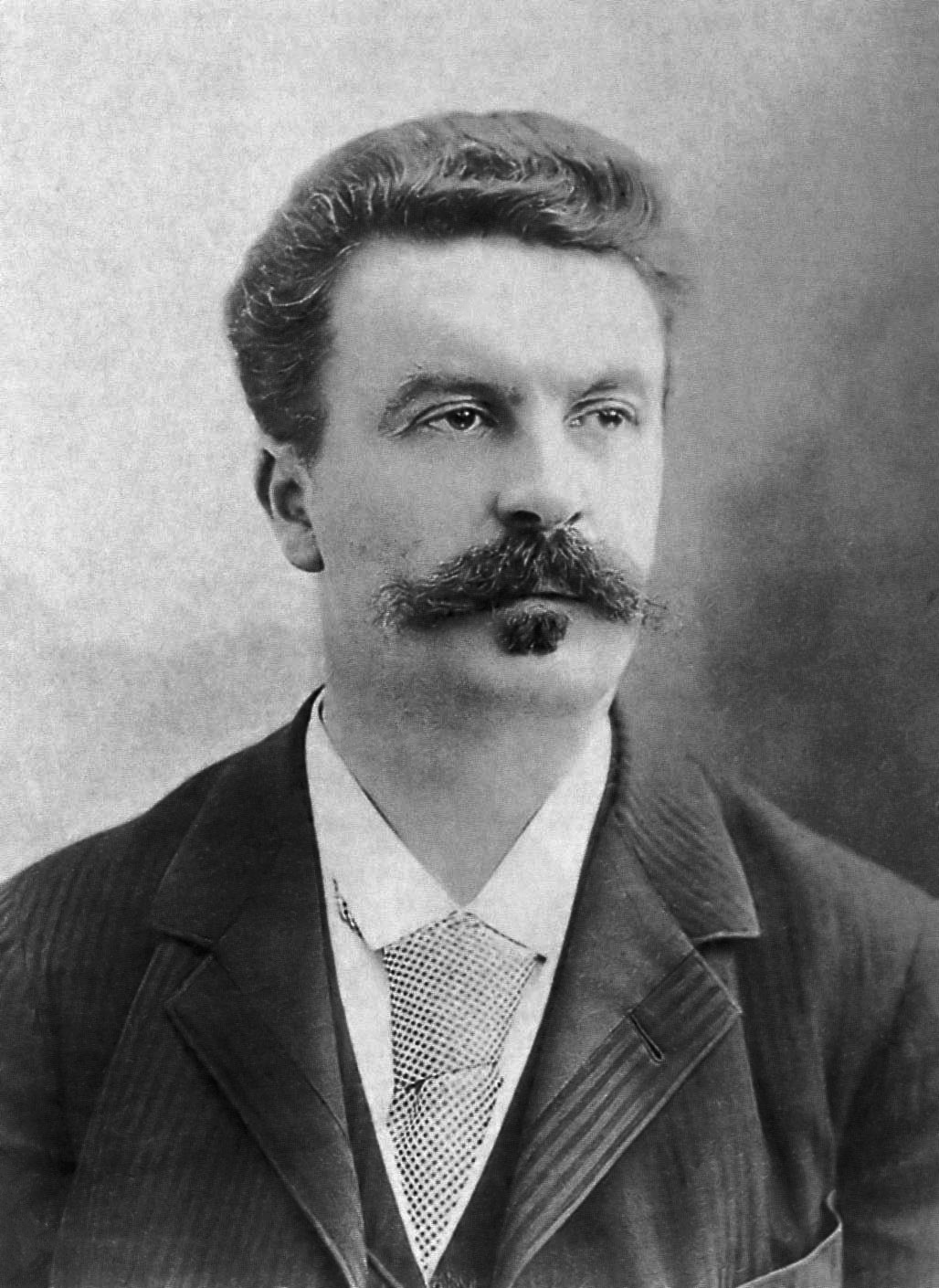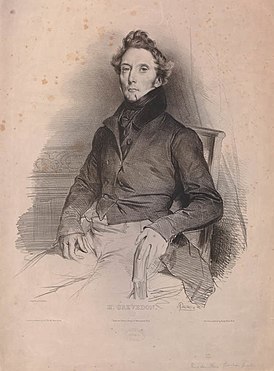
Chez le Père Lathuille, 1879 - Édouard Manet
They had loved each other before marriage with a pure and lofty love. They had first met on the sea-shore. He had thought this young girl charming, as she passed by with her light-colored parasol and her dainty dress amid the marine landscape against the horizon. He had loved her, blond and slender, in these surroundings of blue ocean and spacious sky. He could not distinguish the tenderness which this budding woman awoke in him from the vague and powerful emotion which the fresh salt air and the grand scenery of surf and sunshine and waves aroused in his soul.
She, on the other hand, had loved him because he courted her, because he was young, rich, kind, and attentive. She had loved him because it is natural for young girls to love men who whisper sweet nothings to them.
So, for three months, they had lived side by side, and hand in hand. The greeting which they exchanged in the morning before the bath, in the freshness of the morning, or in the evening on the sand, under the stars, in the warmth of a calm night, whispered low, very low, already had the flavor of kisses, though their lips had never met.
Each dreamed of the other at night, each thought of the other on awaking, * and, without yet having voiced their sentiments, each longing for the other, body and soul.
After marriage their love descended to earth. It was at first a tireless, sensuous passion, then exalted tenderness composed of tangible poetry, more refined caresses, and new and foolish inventions. Every glance and gesture was an expression of passion.
But, little by little, without even noticing it, they began to get tired of each other. Love was still strong, but they had nothing more to reveal to each other, nothing more to learn from each other, no new tale of endearment, no unexpected outburst, no new way of expressing the well-known, oft-repeated verb.
They tried, however, to rekindle the dwindling flame of the first love. Every day they tried some new trick or desperate attempt to bring back to their hearts the uncooled ardor of their first days of married life. They tried moonlight walks under the trees, in the sweet warmth of the summer evenings: the poetry of mist-covered beaches; the excitement of public festivals.
One morning Henriette said to Paul:
“Will you take me to a cafe for dinner?”
“Certainly, dearie.”
“To some well-known cafe?”
“Of course!”
He looked at her with a questioning glance, seeing that she was thinking of something which she did not wish to tell.
She went on:
“You know, one of those cafes, oh, how can I explain myself ? a sporty cafe!”
He smiled: “Of course, I understand, you mean in one of the cafes which are commonly called bohemian.”
“Yes, that's it. But take me to one of the big places, one where you are known, one where you have already supped, no dined, well, you know, I...I...oh! I will never dare say it!”
“Go ahead, dearie. Little secrets should no longer exist between us.”
“No, I dare not.”
“Go on; don't be prudish. Tell me.”
“Well, I...I...I want to be taken for your sweetheart there! and I want the boys, who do not know that you are married, to take me for such; and you too, I want you to think that I am your sweetheart for one hour, in that place which must hold so many memories for you. There! And I will play that I am your sweetheart. It's awful, I know, I am abominably ashamed, I am as red as a peony. Don't look at me!”
He laughed, greatly amused, and answered:
“All right, we will go to-night to a very swell place where I am well known.”
Toward seven o'clock they went up the stairs of one of the big cafes on the Boulevard, he, smiling, with the look of a conqueror, she, timid, veiled, delighted. They were immediately shown to one of the luxurious private dining-rooms, furnished with four large arm-chairs and a red plush couch. The head waiter entered and brought them the menu. Paul handed it to his wife.
“What do you want to eat?”
“I don't care; order whatever is good.”
After handing his coat to the waiter, he ordered dinner and champagne. The waiter looked at the young woman and smiled. He took the order and murmured:
“Will Monsieur Paul have his champagne sweet or dry?”
“Dry, very dry.”
Henriette was pleased to hear that this man knew her husband's name. They sat on the couch, side by side, and began to eat.
Ten candles lighted the room and were reflected in the mirrors all around them, which seemed to increase the brilliancy a thousand-fold. Henriette drank glass after glass in order to keep up her courage, although she felt dizzy after the first few glasses. Paul, excited by the memories which returned to him, kept kissing his wife's hands. His eyes were sparkling.
She was feeling strangely excited in this new place, restless, pleased, a little guilty, but full of life. Two waiters, serious, silent, accustomed to seeing and forgetting everything, to entering the room only when it was necessary and to leaving it when they felt they were intruding, were silently flitting hither and thither.
Toward the middle of the dinner, Henriette was well under the influence of champagne. She was prattling along fearlessly, her cheeks flushed, her eyes glistening.
“Come, Paul; tell me everything.”
“What, sweetheart?”
“I don't dare tell you.”
“Go on!”
“Have you loved many women before me?”
He hesitated, a little perplexed, not knowing whether he should hide his adventures or boast of them.
She continued:
“Oh! please tell me. How many have you loved?”
“A few.”
“How many?”
“I don't know. How do you expect me to know such things?”
“Haven't you counted them?”
“Of course not.”
“Then you must have loved a good many!”
“Perhaps.”
“About how many? Just tell me about how many.”
“But I don't know, dearest. Some years a good many, and some years only a few.”
“How many a year, did you say?”
“Sometimes twenty or thirty, sometimes only four or five.”
“Oh! that makes more than a hundred in all!”
“Yes, just about.”
“Oh! I think that is dreadful!”
“Why dreadful?”
“Because it's dreadful when you think of it, all those women and always, always the same thing. Oh! it's dreadful, just the same, more than a hundred women!”
He was surprised that she should think that dreadful, and answered, with the air of superiority which men take with women when they wish to make them understand that they have said something foolish:
“That's funny! If it is dreadful to have a hundred women, it's dreadful to have one.”
“Oh, no, not at all!”
“Why not?”
“Because with one woman you have a real bond of love which attaches you to her, while with a hundred women it's not the same at all. There is no real love. I don't understand how a man can associate with such women.”
“But they are all right.”
“No, they can't be!”
“Yes, they are!”
“Oh, stop; you disgust me!”
“But then, why did you ask me how many sweethearts I had had?”
“Because...”
“That's no reason!”
“What were they-actresses, little shop girls, or society women?”
“A few of each.”
“It must have been rather monotonous toward the last.”
“Oh, no; it's amusing to change.”
She remained thoughtful, staring at her champagne glass. It was full, she drank it in one gulp; then putting it back on the table, she threw her arms around her husband's neck and murmured in his ear:
“Oh! how I love you, sweetheart! how I love you!”
He threw his arms around her in a passionate embrace. A waiter, who was just entering, backed out, closing the door discreetly. In about five minutes the head waiter came back, solemn and dignified, bringing the fruit for dessert. She was once more holding between her fingers a full glass, and gazing into the amber liquid as though seeking unknown things. She murmured in a dreamy voice:
“Yes, it must be fun!”

Henri René Albert Guy de Maupassant 1850 – 1893 was a 19th-century French author, remembered as a master of the short story form, and as a representative of the Naturalist school, who depicted human lives and destinies and social forces in disillusioned and often pessimistic terms.
Maupassant was a protégé of Gustave Flaubert and his stories are characterized by economy of style and efficient, seemingly effortless dénouements (outcomes). Many are set during the Franco-Prussian War of the 1870s, describing the futility of war and the innocent civilians who, caught up in events beyond their control, are permanently changed by their experiences. He wrote 300 short stories, six novels, three travel books, and one volume of verse. His first published story, "Boule de Suif" ("The Dumpling", 1880), is often considered his masterpiece.




















